On a literary roll!
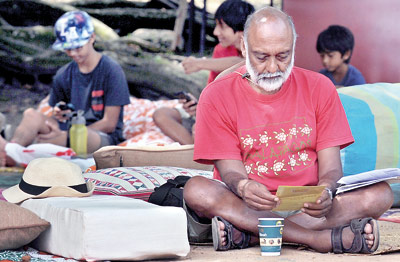
Time for a read
Iced-tea and large blue programme in hand, participants at the Galle Literary Festival were easy to spot last weekend.
Retreating to the cushion-strewn shade of the Lit Café or grabbing an ice-cream cone before the next session, some participants, rather prudently, chose to show-up in their running shoes.
We made do with regular footwear, and in our attempt to be on time for each session, encountered the likes of featival curator Shyam Selvadurai on countless occasions striding as briskly as dignity would allow with the same intent.
Although the book tent offered books that stretched many a wallet many participants were to be seen lounging with a newly purchased book by one of the festival’s speakers, of whom there were many. Here’s our breakdown of a few sessions attended on Friday and Saturday (January 15 and 16):
Poetic prescription for all that ails you
In one of our favourite sessions, Forward Prize founder William Sieghart shared his trick for reading poetry (and enjoying it)-always read it out loud to yourself.
Sieghart explained the idea behind his poetry pharmacy; you tell him your problems, and he’ll give you a poem to take heart with. “I’m by no means a shrink,” he noted, “but poetry helps.” (he put together the collection ‘Winning Words’ inspired by the same).
Sieghart shared with his audience words to remember from one of his favourite ‘prescriptions’-“I wish I could show you/When you’re lonely or in darkness/ the astonishing light of your own being.”
Sri Lanka’s War and Peace Through Indian Eyes
Moderator Sanjana Hattotuwa put authors Rohini Mohan and Samanth Subramaniam through their paces in a session that you knew would inevitably provoke (an eventful Q&A session saw Hattotuwa sternly dismissing an audience member determined to have the limelight, although this caused dissension in the back rows-“we’d like to hear the question!”).
Mohan and Subramaniam gave their audience a reasonable insight into the painstaking research process of their books The Seasons of Trouble: Life amid the Ruins of Sri Lanka’s Civil War and This Divided Island (respectively), and the judgment calls that had to be made in the writing process.
Contemporary trends and achievements in Sinhala Literature
Jayatilake Kammallweera and Nandana Weerasinghe, two well known scholars of Sinhala literature read from selected works and touched upon the subject of war and writers that explored poetry on the topic.
“Though we speak extensively about the war,” said Weerasinghe “the younger generation of poets is yet to step beyond the perimeters that have already been established.”
Kammallweera expressed dissatisfaction about the state of the local education system’s Sinhala literature curriculum, calling for a more open-ended approach to select work that students would actually enjoy.
Omar Musa and Padma Viswanathan: Trauma, migration and recovery
Musa, a poet, rapper and author spoke passionately about turning to poetry as a young man growing up in Australia, noting-“hip hop helps people overcome the inability to communicate in their own language.” A Q&A session with the audience was peppered with observations and experiences from like-minded young people.
Shyam Selvadurai & Sonali Deraniyagala: Memoir vs autobiographical fiction
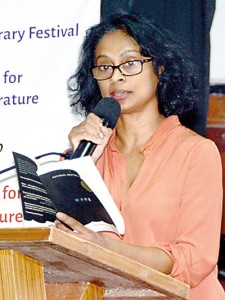
Sonali Deraniyagala
How can personal narratives translate in memoirs versus autobiographical fiction? Both Deraniyagala and Selvadurai were engaging speakers; Deraniyagala perhaps a bit more reticent, understandably, than her counterpart.
Selvadurai touched upon the eternal problem of writing fiction that draws elements from the author’s own life-everyone assumes that the author encounters the exact same characters in their daily lives. “My family suffers!” he said wryly.
Literary dinner with Meera Syal
Perhaps you’ll remember Meera Syal from Goodness Gracious Me, or The Kumars at No 42. Or maybe you’ll know her books better-Life Isn’t All Ha Ha Hee Hee and Anita and Me, both of which were adapted to the screen. Syal was the star of a literary dinner hosted at Kahanda Kanda as part of GLF’s schedule.
We left the Galle Fort rather rashly assuming the boutique hotel to be a hop, skip and a jump away as the out –of- towner usually assumes everything in Galle to be. 18 km, 30 minutes, several wrong turns and three bemused locals later, we arrived at the stunning villa, poised at the end of a winding lane.
The open lounge area was humming with conversation, and as one visitor to the hotel cheekily noted, “you can tell the evening’s about to start when the glamorous people arrive fashionably late.”
Syal herself was utterly charming, making conversation with her fellow guests and easily answering questions about her stay in Lanka.
She read from her newest novel ‘The House of Hidden Mothers’, a foray into India’s surrogacy industry through the eyes of two women-Shyama, a 48-year-old woman in England desperate for another child and Mala, trapped in an oppressive marriage in India, dreaming of escape.
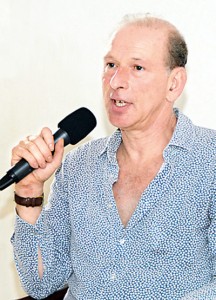
William Sieghart
At a later session on Saturday, 15th with moderator Minoli Ratnayake, Syal explained her rationale for making Shyama an older woman-aging is to be embraced, she noted. On the topic of surrogacy-“I felt like surrogacy was a perfect metaphor for the relationship between India and the world (…) I was fascinated by the power balance between the women at the heart of it.”
Comedy and Comic Writing- Shehan Karunatilake, Sebastian Faulks and Chhimi Tenduf-La
Saturday started-off with a few laughs when these three writers took to the stage. It’s significantly easier to not set-out writing a comic novel according to Sebastian Faulks whose style is suffused with British humour.
When a reader is forewarned to expect jokes, there’s impending danger of not meeting the mark of an essentially “funny book.”
Speaking of his work, a title in homage to P.G. Wodehouse, “there’s always the question of ‘would I dare to do something like that?’” in taking-on his eloquent yet subtly hilarious tone.
Exploring the spectrum of “what amounts to funny,” Shehan Karunatilake said his research was mostly done by observing a Sri Lankan gathering. Basing his always intoxicated narrator WG on “your typical drunk uncle” he noted that in Sri Lanka, “humour which is too subtle is generally mistaken for fact.”
Saba Douglas Hamilton- The secret life of elephants
No one in Saba’s audience guessed they could become so attached to these trunked mammals in just an hour. Introducing us to a few of the thousand-odd elephants within the safety of Save the Elephants’ North-Kenyan reserve she highlighted the unfortunate accident in 2012 which saw a hike in the world ivory market.
“The UN failed to place sanctions on the sale of ivory products” although poaching was prohibited. Thankfully today, the efforts of many celebrities and policy makers have mitigated the damage to a fair extent she said inviting her audience to an ivory-burning event later-on this month.
Tom Holland- Dynasty: The Rise and Fall of the House of Caesar
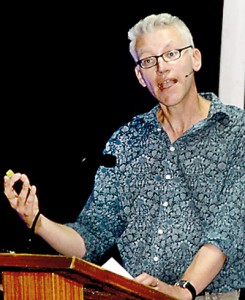
Tom Holland
Scandalous parties, exceedingly lavish life choices and questionable rituals are what initially comes to mind according to Tom Holland at the mention of the Roman Empire.
Inviting his audience to speculate if this was in fact merely slander to taint prominent family lines he said it left the historian stopping to think “what is going on.”
Two things must be remembered he said at the lecture which gave a glimpse into his book, Dynasty. Before subscribing to alleged accounts of eons past, we’re warned that “Romans loved gossip, they would have loved the internet,” and that much in fact happened behind closed doors which suggests surviving stories may have quite likely been based on rumour.
Contemporary Tamil Poetry- S. Pathmanathan
Poet and veteran translator, S. Pathmanathan held the fort, reading a series of soulful verse discussing the works thematically. The little gathering listened attentively to the readings in English, translated from Tamil.
The creative voice from Sri Lanka’s Tamil population seemed pre-occupied with dark themes reflecting political unrest and brutal war.
“It’s changing” however, according to the presenter, who said younger authors are penning poetry on diverse themes. Perhaps these will take time to collect momentum, but “we can hope and pray” that Sri Lankan Tamil poetry takes on a more positive tone.
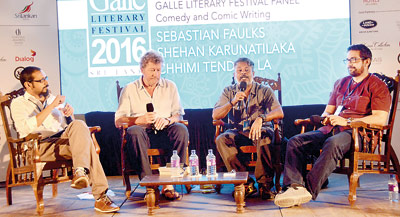
The session on comedy and comic writing with moderator Deshan Tennekoon, Sebastian Faulks, Shehan Karunatilake and Chhimi Tenduf-La
Pix by Amila Gamage and M.D. Nissanka
| Making music together The Chamber Music Society of Colombo performed a selection of classics at the Dutch Reformed Church inside the fort. 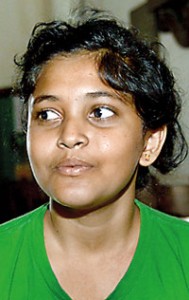 Rashmi Navoda What made it a stand-out event wasn’t only the melodious strains of Vivaldi or Mozart by the senior musicians for joining them were students from The Music Project, playing classical pieces on their instruments with great concentration. The Music Project brings together gifted children and their families from the North and the South by developing the musical talents of the young students. Performing orchestral pieces for an audience of this nature is something they’re encouraged to do as part of the project. Lakshan Madushanka, a project coordinator noted that the kids have undergone major transformation from when they joined. “Some of them have no western music background at all, but they’ve developed so much and play with a lot of confidence,” he noted. A. Laxika, 15, is from Mallavi Central College in Mullaitivu. She plays the violin and her ambition is “to become a doctor who can do any type of surgery.” Joining the Music Project when she was in grade 6, she says they were first taught the recorder. “If we did well they let us graduate to other instruments.” She added-“I want to also make my mark as a good violin player.” 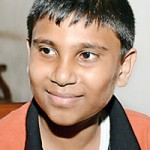 Avantha Nayanajith Enjoying her practice time, she resorts to it daily we’re told. “I liked the violin since I was small.” In the brief moments spent with her peers from Kurunegala before the big performance, she says “we speak different languages but both Sinhalese and Tamils are working together” in the orchestra. Sundaralingam Pooysitta, 15, plays the drums. “I don’t know why they chose it for me” she smiles, but it’s clear she loves it. “I’m not nervous” she says, “I’ve been practising for a long time.” From Kurunegala, we met 12-year-old Rashmi Navoda and 11-year-old Avantha Nayanajith. Rashmi, plays the violin while Avantha plays the cello. Both were unanimous in their agreement that the project had changed their lives. |


